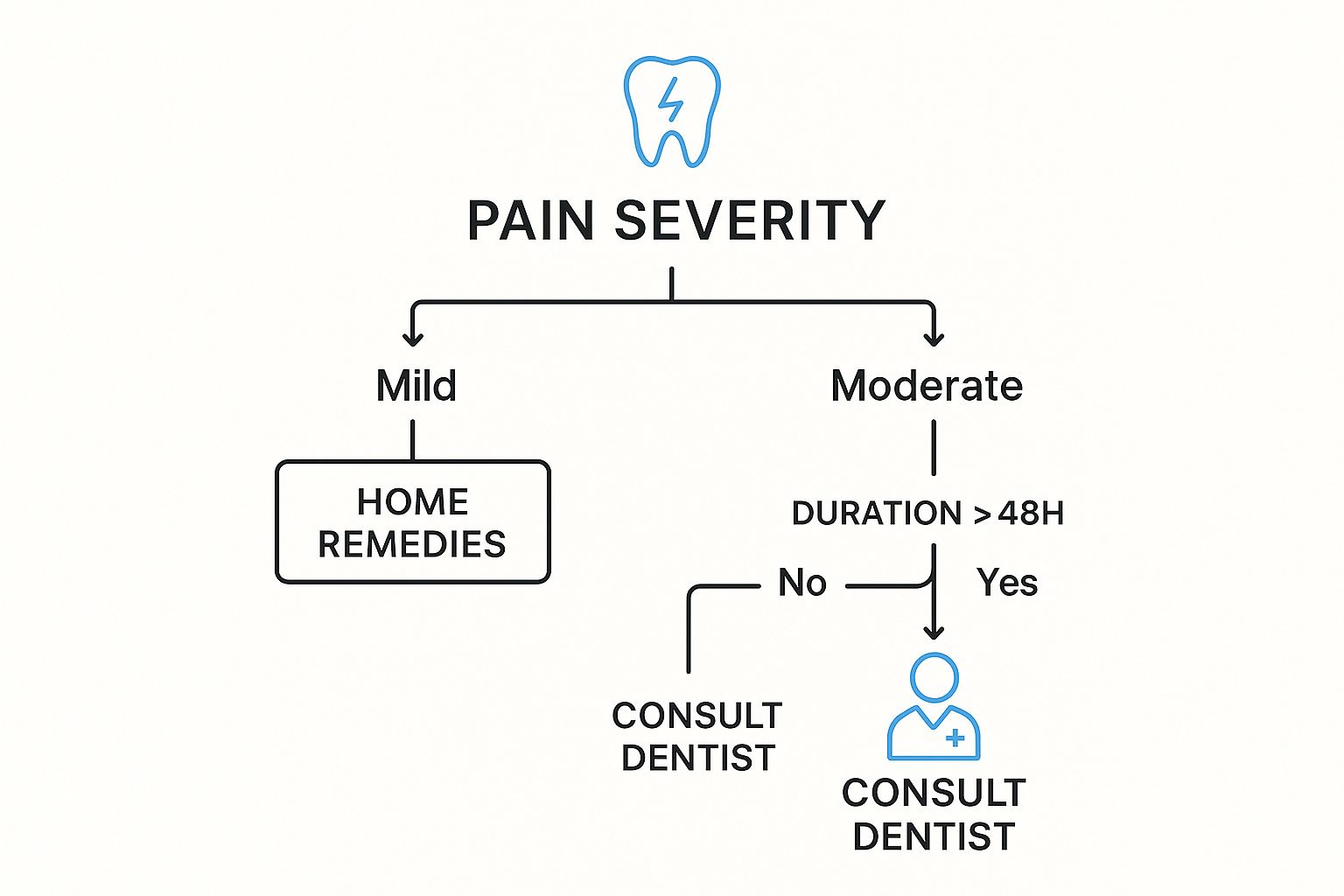When a toothache strikes, your first and only priority is making it stop. Right now. We understand completely. That sudden, throbbing ache can be all-consuming, and finding fast, effective dental pain relief in NZ becomes your entire focus.
For immediate comfort, a mix of over-the-counter medication and a few smart home remedies can certainly take the edge off. But it’s important to see this as just a temporary fix. At City Dentists, our caring Wellington team knows that real, lasting relief only comes when we find and gently treat what’s causing the pain in the first place.
Finding Fast Relief for Your Dental Pain
That sudden, throbbing ache or a sharp pain that shoots through your tooth can be completely debilitating. It can ruin your workday, spoil a meal with friends, or steal a good night’s sleep. We get it – when you’re in that much pain, you just want it gone.
While the steps below are no substitute for seeing one of our dentists, they can help you get a handle on the discomfort and feel a bit more in control. Think of this as your first aid kit for tooth pain.
It’s also helpful to notice what kind of pain you’re feeling. Is it a dull, constant ache? Or a sharp jab you only feel when you bite down? Paying attention to these details can give us valuable clues when you come to see us.
At-Home Care and Over-the-Counter Options
For most Wellingtonians, the first port of call is the local pharmacy. Anti-inflammatory medications like ibuprofen are often a great choice because they target the inflammation that’s usually the real source of the pain. Paracetamol can also be a big help in blocking pain signals. Just be sure to follow the packet instructions and have a chat with the pharmacist if you have any other health conditions.
Alongside medication, a few simple things at home can provide a surprising amount of comfort:
- Saltwater Rinse: It’s a classic for a reason. Gently swishing with warm, salty water helps to clean the area and can soothe inflamed gums around the sore tooth.
- Cold Compress: An ice pack wrapped in a tea towel, held against your cheek for 15-minute intervals, can work wonders to numb the area and bring down any swelling.
- Avoid Triggers: Try to steer clear of foods and drinks that are really hot, cold, sugary, or acidic. They can easily aggravate a tooth that’s already feeling sensitive.
This simple guide can help you manage your pain at home and decide when it’s time to give our friendly team a call.

The main takeaway here is pretty clear: while home remedies are great for mild or moderate pain, if it’s severe or hangs around for more than a day or two, it’s a clear sign you need professional care.
Tooth pain is your body’s warning light flashing on the dashboard. While home care can dim the light for a bit, it won’t fix the engine. Listening to that signal early is the best way to stop a small issue from turning into a major one.
These measures are all about getting you through the immediate crisis. For a few more ideas, you can check out our post on quick tips for dealing with toothache pain. But always remember, the goal of at-home care is simply to make you comfortable enough to get to a dentist for a proper, long-term solution.
Understanding What Causes Toothaches

Before we can provide lasting relief, we first have to figure out why your tooth is hurting. Think of that throbbing or sharp pain as your body’s alarm system—it’s a clear signal that something isn’t right. Understanding what’s triggering the alarm is the first step toward getting the effective dental pain relief NZ residents deserve.
Trying to pinpoint the problem yourself can feel a bit overwhelming. Our team is here to help you connect the dots between your symptoms and what might be going on, using simple, clear language.
Tooth Decay and Cavities
More often than not, the prime suspect behind a toothache is tooth decay, which eventually leads to a cavity. Imagine your tooth’s enamel—its hard outer layer—as a protective fortress wall. When bacteria team up with sugary foods left on your teeth, they produce acids that start chipping away at that wall.
In the beginning, you might just notice a little twinge of sensitivity with a cold drink or something sweet. But if the decay is left to advance, it will get through to the sensitive inner layers of your tooth. That’s when a small, easily fixed issue can turn into a much more persistent and painful problem.
Gum Disease and Inflammation
Sometimes, the pain isn’t coming from the tooth itself but from the gums that support it. Your gums are designed to form a tight, healthy seal around each tooth. When plaque builds up along this gum line, it can cause inflammation.
The early stage is called gingivitis. You might see your gums looking red and swollen, or notice a bit of bleeding when you brush. If it’s not addressed, the inflammation can worsen, causing the gums to pull away from the teeth. This creates small pockets where bacteria can get trapped, leading to a dull, constant ache that can eventually damage the bone holding your teeth in place.
Cracks, Chips, and Trauma
Ever get a sudden, sharp pain when you bite down? That could be a sign of a cracked or chipped tooth. It can happen from a knock during sports, biting on something unexpectedly hard like a nut shell, or even from grinding your teeth in your sleep.
A cracked tooth is like a fracture in a teacup; it might not be obvious at first glance, but it compromises the whole structure. This tiny opening allows bacteria and temperature changes to irritate the sensitive nerve deep inside, causing sharp, unpredictable pain.
Abscesses and Infections
A dental abscess is a serious infection—a pocket of pus that forms either at the root of a tooth or in the nearby gums. This is your body’s reaction to bacteria getting deep inside the tooth, usually through an untreated cavity, a crack, or an injury.
An abscess can cause an intense, throbbing pain that might even spread to your jaw or neck. You could also have a swollen face or a persistent bad taste in your mouth. This is a dental emergency; it won’t clear up on its own and needs immediate professional care.
For a more detailed look at what might be behind your specific pain, our article on the five possible causes of toothaches is a great resource.
The Real Risk of Ignoring Dental Pain
It’s completely understandable to hope a toothache will just sort itself out. Life in Wellington is busy, and let’s be honest, slotting in an unexpected trip to the dentist can feel like a major hassle. We also know that many Kiwis worry about the cost, which is a very real concern we hear and respect every day.
But putting off that visit is a bit like seeing the check engine light flash on your car’s dashboard. You can pretend it’s not there, but ignoring it almost always leads to a much bigger, more complicated, and far more expensive problem down the track.
We get it—for many, money is a genuine barrier. In fact, recent research showed that a staggering 42% of New Zealanders couldn’t afford regular dental care, which forces them to delay treatment. You can read more about the stories behind these sobering statistics over at consumer.org.nz. This reality just highlights why getting on top of things early is so important.
How a Small Problem Can Escalate
That first little twinge of sensitivity is often the first whisper of a small cavity. At this stage, the fix is usually quick and simple—a standard filling that’s straightforward and relatively low-cost. It’s the least invasive and most affordable path for dental pain relief NZ residents can take.
The problem is, if that cavity is left to its own devices, the decay doesn’t hit pause. It keeps burrowing deeper, moving past the tough outer enamel and into the softer tissues inside. And that’s when the real trouble begins.
Think of it like a tiny leak in your roof. At first, it’s just a small drip you can catch with a bucket. But if you ignore it, that slow drip will eventually rot the timber, damage your ceiling, and lead to a major structural issue. A small cavity works in much the same way.
The Consequences of Delaying Care
Once decay reaches the tooth’s nerve, it can spark a serious infection called a dental abscess. This isn’t a minor ache; it’s an intense, throbbing pain that home remedies can’t fix. An abscess is a true dental emergency that requires more complex treatment, like a root canal, just to save the tooth. In a worst-case scenario, the tooth might be too far gone and need to be removed entirely.
What’s even more concerning is that some serious dental infections can be surprisingly quiet. It’s crucial to understand why you shouldn’t ignore even painless dental infections, as they can cause significant damage without any obvious signs.
Ultimately, seeking help early isn’t just about stopping the immediate pain. It’s the smartest investment you can make in your long-term health, your wallet, and your peace of mind. Tackling a small problem now is always better than facing a major one later.
How We Provide Lasting Pain Relief

When you’re ready to find a real, lasting solution, our team at City Dentists is here to help. We understand that walking into a dental clinic can be unnerving, especially when you’re already in pain. That’s exactly why our entire approach is built on trust, clear communication, and genuinely gentle care.
Our goal isn’t just to patch up the symptom; it’s to find and fix the root cause of your discomfort for good. We see ourselves as your partners in getting you back to feeling great. From the moment you call us, you’ll find a warm, professional team where your concerns are heard and your comfort is our top priority. We’re here to provide the lasting dental pain relief NZ residents can rely on.
Your Personalised Treatment Plan
Every toothache has its own story, which means every solution has to be just as personal. We simply don’t believe in a one-size-fits-all approach. Instead, we start with a thorough but gentle examination to get to the bottom of what’s causing your pain. This often involves taking a detailed impression of your teeth to get a clear picture.
Then, we sit down with you and explain what we’ve found in simple, easy-to-understand terms. We’ll walk you through all your treatment options, explaining the pros and cons of each, and answer every single question you have. Together, we’ll create a plan that you feel completely confident and comfortable with.
Your dental care should be a partnership, not a lecture. We listen, we explain, and we empower you with the information you need to make the best decision for your health. Your peace of mind is just as important as the clinical outcome.
Our Modern and Gentle Treatments
At our Wellington clinic, we use modern, proven techniques to resolve your pain effectively while making sure the process is as gentle as it can be. We’re not about intimidating tools or confusing jargon; we’re about delivering effective care that makes you feel safe.
Here are some of our common treatments for dental pain:
- Gentle Fillings: If a cavity has broken through the tooth’s surface, we’ll carefully clear out the decay and place a durable filling. This restores the tooth’s strength and seals it off from any more damage, and we take our time to make sure it’s a comfortable experience.
- Root Canal Therapy: When an infection reaches the delicate nerve inside your tooth, a root canal is often the best way to save it. We gently clean out the infected tissue, which relieves the intense pain and, most importantly, preserves your natural tooth.
- Gum Disease Treatment: For pain that comes from inflamed or infected gums, our hygienists provide specialised cleaning to remove harmful bacteria from below the gum line. This helps restore your gums to health and stops the ache.
- Tooth Extractions: While we always do everything we can to save a natural tooth, sometimes taking it out is the kindest and most necessary option. If that’s the case, we handle the procedure with the utmost care, focusing on a gentle technique and ensuring you’re comfortable from start to finish.
At City Dentists, we combine our technical skill with a reassuring human touch, making your journey from pain to relief as smooth and supported as possible.
Protecting Your Child from Dental Pain
As a parent, there’s nothing worse than seeing your child in pain. When that pain comes from a toothache, it can be especially distressing for the whole family. In New Zealand, the biggest threat to a child’s happy, healthy smile is tooth decay, and it’s a major public health issue right here at home.
A review of children’s oral health painted a pretty stark picture. Back in 2014, around 7,755 Kiwi children aged 0-13 needed dental work under general anaesthesia—a figure that had shot up by 67% in just a decade. You can read more about these findings on the impact of dental caries on children in NZ. This really brings home just how vital it is to build good habits from the very beginning.
Building a Foundation for a Healthy Smile
Preventing dental pain isn’t something you start thinking about when a toothache appears. It’s all about creating positive, consistent routines that will protect their teeth for life. The aim is to make looking after their teeth a normal, stress-free part of their day.
Here are a few practical ways to get started:
- Start Early: The moment that first little tooth pokes through, gently wipe it with a clean, damp cloth. As more teeth arrive, move to a soft, child-sized brush with just a tiny smear of fluoride toothpaste.
- Brush Together: Turn toothbrushing into a fun, twice-a-day family ritual. When they see you brushing your own teeth, it teaches them that this is just a normal, important thing everyone does.
- Mind the Sugar: Keep a close eye on sugary drinks and snacks. These are the primary fuel for the bacteria that cause cavities. For healthy teeth, water and milk are always the best choices.
Making Dental Visits a Positive Experience
Bringing your child for regular dental check-ups is just as important as daily brushing. Starting these visits from a young age helps them get comfortable and familiar with the dental clinic, which goes a long way in preventing fear or anxiety from developing later on.
A child’s first few trips to the dentist can shape their attitude towards oral health for the rest of their life. By making these initial visits positive and reassuring, we’re not just checking their teeth; we’re building a foundation of trust that will last a lifetime.
Our friendly Wellington team has years of experience making our youngest patients feel safe and comfortable. If you’re worried about how your child might react, we’ve put together some helpful advice in our guide with 5 tips for dealing with child dental phobia.
Together, we can protect your child’s precious smile and help them grow up seeing the dentist as a friendly partner in their health journey.
Your Dental Pain Questions Answered
We know that when you’ve got a toothache, your mind starts racing with questions. The uncertainty can be just as draining as the pain itself. That’s why we’ve put together this straightforward FAQ section to tackle the common concerns we hear from our Wellington patients every day.
Our aim is to give you clear, reassuring answers so you can feel more in control and know what to do next.
What Counts as a Dental Emergency?
It can be tough to judge when a tooth problem is serious enough for an urgent call. While any persistent pain is worth getting checked out, some symptoms are your mouth’s way of screaming for immediate help.
You should seek immediate care if you experience any of the following:
- Severe, throbbing pain that isn’t touched by over-the-counter medication.
- Swelling in your face, jaw, or gums.
- Signs of an infection, like a fever, a foul taste in your mouth, or a small, pimple-like lump on your gum line.
- Pain that starts after an injury or a knock to the face or mouth.
Waiting to see if severe pain will just “go away” often lets a small problem turn into a much bigger, more complicated one. Think of these symptoms as your body’s most urgent warning signal—one that needs a fast, professional response.
How Can I Manage Pain Before My Appointment?
So you’ve booked your appointment, but you still have to get through the next few hours or even a day. The goal now is to stay as comfortable as possible.
A simple saltwater rinse combined with an over-the-counter anti-inflammatory (like ibuprofen) can work wonders. A cold pack held against your cheek can also help numb the area. For now, stick to soft foods and steer clear of anything very hot, cold, or sugary that might set the pain off again.
What if I’m Worried About the Cost?
Concerns about the cost of dental care are completely understandable and something we discuss with patients all the time. It’s a major hurdle for many Kiwis. In fact, it’s estimated that in 2022, cost stopped more than 1.5 million adults in New Zealand from getting the dental treatment they needed. You can discover more about these dental care findings and their national impact.
We firmly believe everyone deserves access to quality dental care. That’s why we are always upfront about treatment costs and will work with you to find a solution that fits your situation.
What if My Pain Is From an Infection?
If your toothache is caused by an infection deep inside the tooth’s nerve, a root canal might be the solution. We know that procedure has a scary reputation, but modern root canals are a safe and incredibly effective treatment designed to get you out of intense pain and, most importantly, save your natural tooth.
If you’re feeling a bit anxious about the idea, you can learn more about getting a root canal and what to expect in our detailed guide. Our team is highly experienced in performing this treatment gently, making sure you are comfortable and informed every step of the way.
At City Dentists, we’re here to provide clear answers and compassionate care to every person who walks through our doors. If you have more questions or need to book an appointment with our dentists in Wellington, please don’t hesitate to get in touch. Visit us at https://www.citydentists.co.nz to get started.

